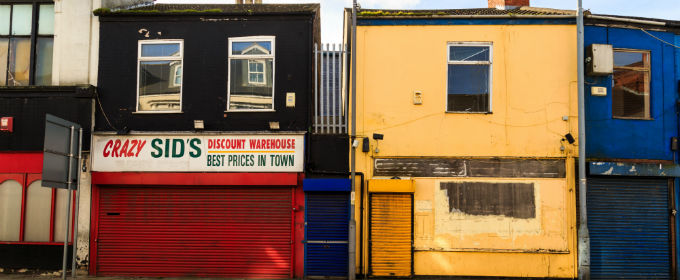Appraisals of regeneration have previously focused on the benefits such schemes bring, rather than also looking at costs and risks. Here Dr Julia Kasmire and Matjaz Vidmar use Glasgow as a case study to ask who stands to benefit the most from regeneration.
- Glasgow’s regeneration scheme has promised 15,000 new jobs but it is not clear if those jobs will be available to locals and offer career development or if they are mostly limited to low-skill offerings with limited advancement opportunities.
- Companies with high-value-added products were launched with a new generation of engineering capability developed in and around them. However, it is not as clear just how attached these industries are to Glasgow.
- One possible solution to this would be to increase transparency over all investment, development and regeneration plans by publishing social impact assessments.
Regeneration is the word on the street. From the Industrial Strategy – and initiatives such as the Northern Powerhouse – to small-scale local investment, everybody has something to say. Recent examples of regeneration efforts aimed at cities or neighbourhoods, like those in Glasgow and Salford, suggest that the costs and benefits are not necessarily evenly distributed, and that the benefits feature much more prominently in the discussion than the costs and risks. Consequently, there are many loud voices calling for regeneration plans to get started quickly, while others are reluctant or even vehemently opposed to the social destruction that regeneration, or `gentrification’ often brings.
Who is pushing for regeneration and who stands to benefit the most?
Glasgow is known as a blue collar city due to the Clydebank wharves with shipbuilding industry. However, recent developments, particularly the one on Broomielaw are advertised under the banner “New Look, New Pride” and show a new orientation. Already companies like Morgan Stanley, JP Morgan, National Australia Group, BNP Paribas and Aon have taken residence along the Clyde. It’s these global financial organisations that are offering the lion’s share of the 15,000 jobs that are widely quoted across news outlets. But who are the people that will be considered for these jobs? Where do they come from? And what are the conditions of their deployment? Surely some of these jobs will be filled by local recruits, but, considering the history of the area, the new firms taking residency in the area are very likely to draw the majority of their 15,000 new employees from elsewhere.
Moreover, it is not clear if those jobs immediately available to locals really offer career development or if they are mostly limited to low-skill offerings with limited advancement opportunities. This begs the question of whether such regeneration efforts and investments increase the living standards of residents or whether they drive out those residents to make room for others with already high living standards. It is also not clear if tax revenues are expected to go up as a result of the regeneration and if so how that extra money will be spent. In the immediate term, it would be important to know if those tax revenues are expected to go up faster than traffic congestion and the cost of living are expected to go up.
Such cases suggest that regeneration can be aimed at a specific space rather than the people or communities already located in that space. After all, the official slogan of the “Glasgow brand” launched by the City Council and seen widely during the 2016 Commonwealth Games, is “People make Glasgow”! It makes sense to ask ‘do the people who make Glasgow really benefit from the New Look and this New Pride?’ If so, when do they get these benefits and for how long will they last? It is also important to ask `who will bear the costs or risks of these investments and developments?’
There are some signs that certain sectors in the city’s economy have done a bit more for Glaswegians, such as high-tech manufacturing in renewable energy and small satellite systems. In partnership with universities in Glasgow, a series of companies with high-value-added products were launched and a new generation of engineering capability developed in and around them. However, it is not as clear just how attached these industries are to Glasgow and by extension to its people in the long term. Are these companies and opportunities “Making Glasgow” or are they just stopping by?
Increasing transparency
One possible solution would be to increase transparency over all investment, development and regeneration plans. This means more than just putting some of the plans up for public consultation: there should be a real demand for a published social impact assessment. Such projects are already required to conduct environmental impact studies but the social environment is just as important. Questions about the distribution of costs and benefits need to be asked and the answers need to be made public.
